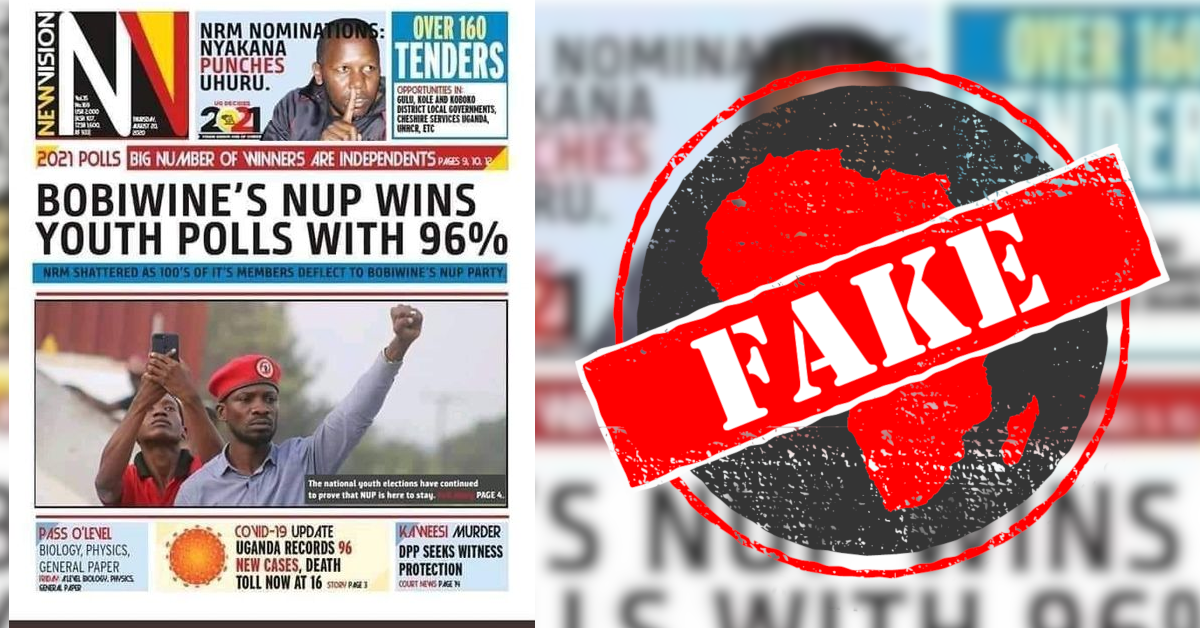An image shared on Facebook appears to show the front page of Ugandan newspaper New Vision, with the headline: “BOBIWINE’S NUP WINS YOUTH POLLS WITH 96%”.
The summary below reads: “NRM SHATTERED AS 100’S OF ITS MEMBERS DEFLECT TO BOBIWINE’S NUP PARTY.”
The page also shows a photo of Ugandan opposition politician Robert Kyagulanyi Ssentamu, popularly known as Bobi Wine.
Data from CrowdTangle, Facebook’s public insights tool, shows the page has been shared dozens of times and has attracted hundreds of reactions.
New Vision is published by Vision Group, a media house in which the Ugandan government owns a majority.
Wine is the leader of the National Unity Platform and a presidential candidate in the upcoming general elections scheduled for early 2021. He is challenging president Yoweri Museveni, flag bearer of the ruling National Resistance Movement.
With elections around the corner, in a country with a relatively restricted media environment, would a government-owned newspaper splash good news for the opposition, and bad news for its owners, on its front page?
We checked.

The front page shared on Facebook has grammatical errors, misspells Bobi Wine as “Bobiwine” and uses “deflect” instead of “defect”.
The font size is also not proportional to the newspaper’s usual headlines, but appears small and squeezed.
These are all signs that the page was digitally manipulated, like a number of other photoshopped front pages Africa Check has debunked.
And the headline claims that NUP won the youth polls with 96%. But we could find no other trustworthy reports of such results.
The fake front page is dated 20 August 2020. On the same page, New Vision shared the front page of the day’s newspaper on their official Facebook page.
And the real headline is more in keeping with what you would expect from a government-backed newspaper. It reads: “NRM WINS YOUTH POLLS WITH 79%.” – Grace Gichuhi
The summary below reads: “NRM SHATTERED AS 100’S OF ITS MEMBERS DEFLECT TO BOBIWINE’S NUP PARTY.”
The page also shows a photo of Ugandan opposition politician Robert Kyagulanyi Ssentamu, popularly known as Bobi Wine.
Data from CrowdTangle, Facebook’s public insights tool, shows the page has been shared dozens of times and has attracted hundreds of reactions.
New Vision is published by Vision Group, a media house in which the Ugandan government owns a majority.
Wine is the leader of the National Unity Platform and a presidential candidate in the upcoming general elections scheduled for early 2021. He is challenging president Yoweri Museveni, flag bearer of the ruling National Resistance Movement.
With elections around the corner, in a country with a relatively restricted media environment, would a government-owned newspaper splash good news for the opposition, and bad news for its owners, on its front page?
We checked.

Clues front page doctored
The front page shared on Facebook has grammatical errors, misspells Bobi Wine as “Bobiwine” and uses “deflect” instead of “defect”.
The font size is also not proportional to the newspaper’s usual headlines, but appears small and squeezed.
These are all signs that the page was digitally manipulated, like a number of other photoshopped front pages Africa Check has debunked.
And the headline claims that NUP won the youth polls with 96%. But we could find no other trustworthy reports of such results.
NRM wins youth polls
The fake front page is dated 20 August 2020. On the same page, New Vision shared the front page of the day’s newspaper on their official Facebook page.
And the real headline is more in keeping with what you would expect from a government-backed newspaper. It reads: “NRM WINS YOUTH POLLS WITH 79%.” – Grace Gichuhi
Republish our content for free
For publishers: what to do if your post is rated false
A fact-checker has rated your Facebook or Instagram post as “false”, “altered”, “partly false” or “missing context”. This could have serious consequences. What do you do?
Click on our guide for the steps you should follow.
Publishers guideAfrica Check teams up with Facebook
Africa Check is a partner in Meta's third-party fact-checking programme to help stop the spread of false information on social media.
The content we rate as “false” will be downgraded on Facebook and Instagram. This means fewer people will see it.
You can also help identify false information on Facebook. This guide explains how.


Add new comment